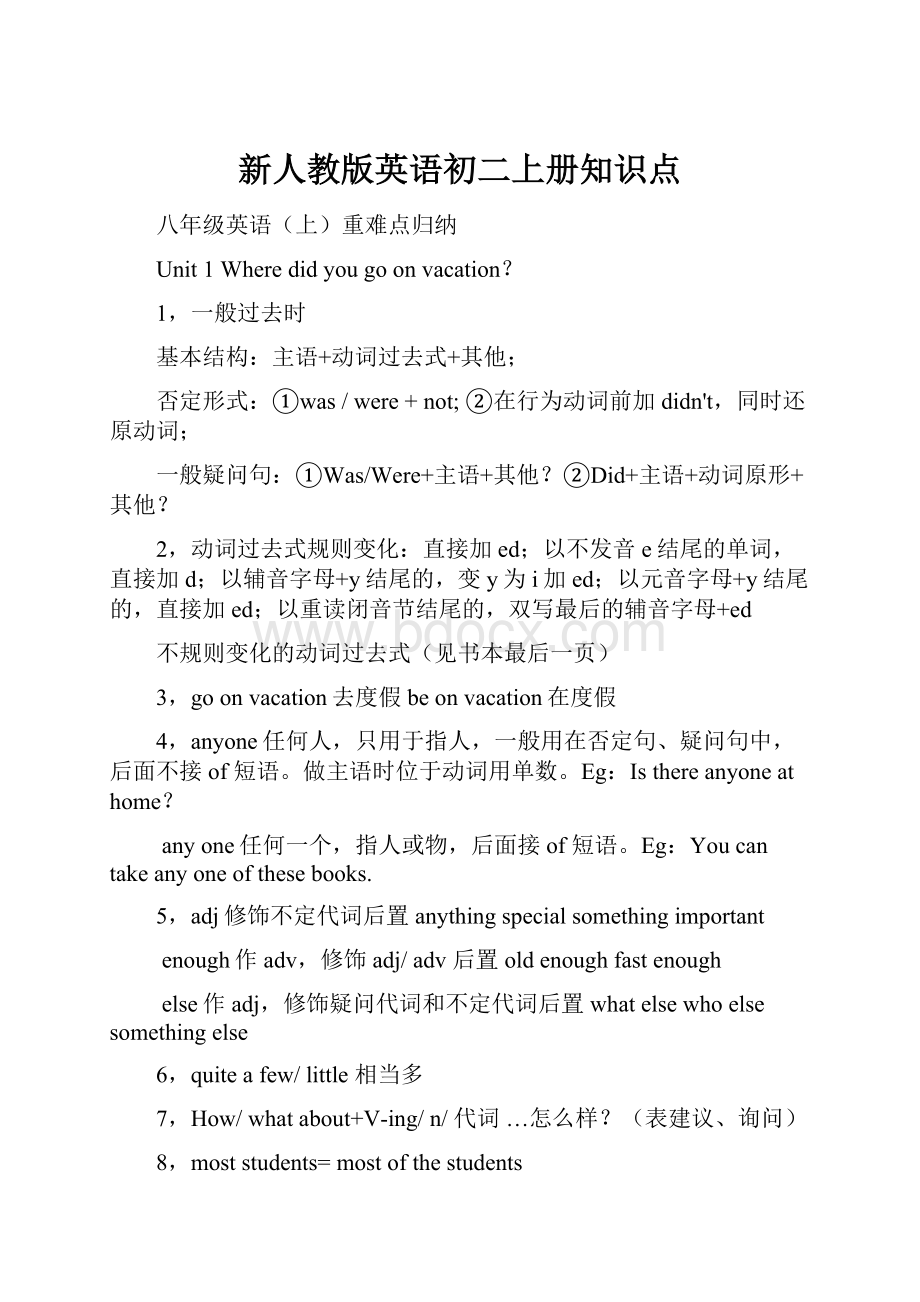 新人教版英语初二上册知识点.docx
新人教版英语初二上册知识点.docx
- 文档编号:20111844
- 上传时间:2023-04-25
- 格式:DOCX
- 页数:28
- 大小:36.06KB
新人教版英语初二上册知识点.docx
《新人教版英语初二上册知识点.docx》由会员分享,可在线阅读,更多相关《新人教版英语初二上册知识点.docx(28页珍藏版)》请在冰豆网上搜索。

新人教版英语初二上册知识点
八年级英语(上)重难点归纳
Unit1Wheredidyougoonvacation?
1,一般过去时
基本结构:
主语+动词过去式+其他;
否定形式:
①was/were+not;②在行为动词前加didn't,同时还原动词;
一般疑问句:
①Was/Were+主语+其他?
②Did+主语+动词原形+其他?
2,动词过去式规则变化:
直接加ed;以不发音e结尾的单词,直接加d;以辅音字母+y结尾的,变y为i加ed;以元音字母+y结尾的,直接加ed;以重读闭音节结尾的,双写最后的辅音字母+ed
不规则变化的动词过去式(见书本最后一页)
3,goonvacation去度假beonvacation在度假
4,anyone任何人,只用于指人,一般用在否定句、疑问句中,后面不接of短语。
做主语时位于动词用单数。
Eg:
Isthereanyoneathome?
anyone任何一个,指人或物,后面接of短语。
Eg:
Youcantakeanyoneofthesebooks.
5,adj修饰不定代词后置anythingspecialsomethingimportant
enough作adv,修饰adj/adv后置oldenoughfastenough
else作adj,修饰疑问代词和不定代词后置whatelsewhoelsesomethingelse
6,quiteafew/little相当多
7,How/whatabout+V-ing/n/代词…怎么样?
(表建议、询问)
8,moststudents=mostofthestudents
“oneof+themost+adj+n复数”表示“最…之一”
Eg:
HeisoneofthemostfamouswritersinChina.
Amost+adj+n非常Eg:
Hangzhouisamostbeautifulcity.
9,buy/getsbsth=buy/getsthforsb
10,whatdoyouthinkof/about…?
=howdoyoulike…?
你认为…怎么样?
11,havefun,enjoyoneself,haveagood/great/wonderfultime+V-ing,
12,主语+seem+(tobe)+表语(n/adj)eg:
Tomseemstobeasmartboy/happy.
Itseemsthat从句eg:
Itseemsthatheunderstand.
主语+seemtodostheg:
Heseemstounderstand.
13,adj以-ing结尾“令人…的”exciting,interesting,relaxing,boring
以-ed结尾“人感到…的”excited,interested,relaxed,bored
14,询问价格:
Howmuchis…?
What’sthepriceof…?
表示价格高低:
…beexpensive/cheap
Thepriceof…ishigh/low
15,getto,arrivein/at,reach,到达(如果后面接地点的副词home,here或there,就不用介词in,at,to)
16,decide(not)todo
decidethat从句
decide+疑问词+不定式
17,try(not)todosth尽力
trydoingsth尝试
try/doone’sbesttodosth
tryiton试穿(动副结构)tryout试验haveatry试一试
18,feellike感觉像feellikedoingsth/wanttodosth/wouldliketodosth
19,alotof=lotsof=plentyof
20,inthepast在过去
21,enjoy/likedoing
22,感叹句:
How+adj+主谓!
How+adj+a/an+n单+主谓!
What+a/an+adj+n单+主谓!
What+adj+n复/不可数+主谓!
23,morethan=over超过lessthan少于moreorless或多或少
24,waitfor等待
25,toomany“太多”修饰可数名词复数
toomuch“太多”修饰不可数名词
muchtoo“实在太”修饰形容词或副词
26,because+从句becauseof+n/V-ing/代词
27,enough作adj修饰n,enoughtimeenoughmoney
haveenough…todostheg:
Ihaveenoughtimetofinishthework.
enough作adv修饰adj/advoldenoughfastenough
…enoughforsbtodostheg:
Thejobiseasyenoughformetodo.
not…enoughtodoThebookisn’teasyenoughformetoread.
too…to…Thebookistoodifficultformetoread.
so…that…ThebookissodifficultthatIcan’tread.
28,thenextday第二天
29,remember/forget+todo要做
+doing做过
30,Stopsbfromdoingsth阻止
Stoptodo停下来去做其他事
Stopdoing停止正在做的事
31,anothertwohours=twomorehours
32,atthetopof在…顶端,名列…之前强调点
onthetopof在…上面强调面
33,findout查明,弄清find找到(结果)lookfor寻找(过程)
34,goonwith/doingsth继续原来的事
goontodosth继续做别的事
35,so+adj+that+结果状语从句“如此……以致……”
eg:
IwassobusythatIdidn’tgotosleepfor3days.
sothat引导目的状语从句,以便,为了(inorderto)
eg:
theygotupearlysothattheycouldcatchtheearlybus.
so+adj+(a/an+n单数)thatItissoimportantameetingthatIcan’tmissit.
such+a/an+adj+n单数+thatItissuchanimportantmeetingthatIcan’tmissit.
such+adj+n复数/不可数+that
Unit2Howoftendoyouexercise?
1,How如何(方式)
howlong多长(时间)答语常用“(For/about+)时间段”
howfar多远(距离)答语常用“(It’s+)数词+miles/meters/kilometers”
howoften多久一次(频率)答语常用“Always/often/everyday/…”或“次数+时间”等表频率的状语
Howsoon多快,多久以后,常用在将来时中。
答语常用“in+时间段”
howmany多少(接可数名词)howmuch(接不可数名词)
2,exercise作v锻炼,运动
作[c]操,练习domorning/eyeexercises
作[uc]锻炼takemuch/moreexercise
3,at+钟点at7o’clockatnoon/atnight(during/intheday)atthis/thattimeattheageof
on+具体某天、星期、特指的一天、纪念日、节日
onApril1stonSundayonacoldwintermorningonTeachers’Day
in+上午、下午、晚上、年、月、季节、年代、世纪inthemorning/afternoon/eveningin1999inAugustinautumnin1960sinthe21stcentury
4,helpsb(to)dosth
helpsbwithsth
withsb’shelp=withthehelpofsb
5,do(the)housework=dochores
6,频度副词(行前be后)
Alwaysusuallyoftensometimesseldomhardlynever
7,sometimes有时(频度副词)sometime(将来)有朝一日,(曾经)某天
Sometimes几次,几倍sometime一段时间(前面用介词for)
8,goshopping=dosomeshopping
9,oncetwicethreetimes
10,atonce,rightnow,rightaway,inaminute,inamoment,innotime立刻,马上
oncemore再一次,重新onceuponatime从前,曾经
11,everyday每天everyday日常的,每天的
12,ontheinternet
13,what’syourfavoriteprogram?
=whatprogramdoyoulikebest?
14,free空闲的inone’sfreetimebefree
自由的asfreeasafishfreedomn.自由
免费的Thebestthingsinlifearefree.
15,befull=bebusy忙的bebusydoingsth/bebusywithsth
befullof充满eg:
Thebottleisfullofmilk.
16,Howcome?
怎么会?
为什么?
17,maybe为情态动词+动词原形,在句子中做谓语,maybe是副词,表示可能,大概,一般放在句首(perhaps)。
18,stayupdoingsth熬夜做某事
19,stay/keephealthybeingood/bad/poorhealthbegood/badforone’shealth
20,atleast=nolessthanatmost=nomorethan
21,asksbaboutsthasksb(not)todosthasksbforhelp/advice/information
22,theresultof…的结果asaresult结果
23,besurprisedthat/besurprisedat/besurprisedtodo对…很惊讶
Toone’ssurprise另某人惊讶的是insurprise惊讶地
24,theanswertothequestion,akeytothedoor,atickettotheballgame
25,although=though(与but不能连用)
Eventhough/if即使,尽管asthough/if仿佛,好像
26,by介词+n/v-ing/代词通过…方式
byoneself独自地bytheway顺便问/说一下bychance/accident偶然地
bymistake错误地learnbyheart记住
27,thebestway/timetodo做某事最好的方式/时间
28,4个花费:
人+spend/spends/spent+时间/钱+(in)doingsth/onsthspendtimewithsb
人+pay/pays/paid+钱+forsth
Ittakes/tooksb+时间+todosth
物+cost/costs/cost+sb+钱
29,diev.死亡,消失died过去式
deadadj死亡的,无生命的deaddoghave/hasbeendeadfor…=died…ago
dyingadj垂死的,快死的
deathn死亡thedeathof…
30,beforeit’stoolate趁来得及
31,“数字+percentof+n”作主语,谓语动词取决于n
Eg:
Twentypercentofthestudentsexerciseeveryday.
Twentypercentoftimepasses.
32,noone=nobody指人,回答who,anyone,anybody的提问
None指人或物,可接of短语,(→all≥3)回答howmany/much,any,及有特定范围(which)的提问
nothing指物,回答what,anything的提问
Unit3I’mmoreoutgoingthanmysister.
1,比较级,最高级变化规则
一般在词尾+er或est;以e结尾的加r或st;重读闭音节双写辅音字母+er或est;辅音字母+y结尾的,改y为i+er或est;多音节词和部分双音节词,加more或most。
不规则变化见书本P114
2,比较级用法
●基本句型:
主语+be+比较级+than+比较对象
●两者相比较用比较级eg:
Whodoyouthinkismoreoutgoing,LilyorLucy?
●Very,more,quite,so,too等修饰原级;much,alittle,alot,abit,far,even等修饰比较级
eg:
I’mmuch/alittle/alot/abit/farmoreoutgoingthanmysister.
I’mevenworsenow.
●不能与人或事物自身相比较
eg:
Heistallerthananyotherstudentinhisclass.
ChinaislargerthananycountryinAfrica.
●比较对象要一致(that代替不可数名词,those代替可数名词复数,所有格,ones)
eg:
TheweatherinHarbinismuchcolderthanthatinWuhan.
ThestudentsofClassOnestudyharderthanthoseofClassTwo.
MybikeisnewerthanTom’s.
●比较级中出现ofthetwo/twins结构时,adj比较级前要+the,不可用than
Eg:
Tomisthetallerofthetwobrothers.
●“get/become+比较级+and+比较级”表示“变得越来越……”(多音节或部分双音节用“moreandmore+原级)
Eg:
Itgetswarmerandwarmerwhenspringcomes.
You’regettingmoreandmorebeautiful.
●“the+比较级……,the+比较级……”表示“越……,就越……”
Eg:
Themoreyouexercise,thestrongeryouwillbe.
●“As…as”中间接原级,表示“与…一样”,否定为“notas/so…as”表示“不如”
Eg:
Heisastallashisfather.
Heisnotas/sotallashisfather.
●“比较级+than”(more/less+原级+than)与“notas/so…as”可以互换
Eg:
I’mtallerthanyou.ChineseismoreimportantthanBiology.
You’reshorterthanme.BiologyislessimportantthanChinese
You’renotas/sotallasme.Biologyisnotas/soimportantasChinese
●比……大/多/长/宽几倍,用“主语+be+……times+比较级+than+比较对象”
Eg:
Ourclassroomistwicelargerthanyours.
●重几斤,高几公分,大几岁……,用“主语+be+数量词+比较级+than+比较对象”
Eg:
I’msixyearsolderthanyou.
3,loudly大声地,响亮地(多含噪音之意)
aloud大声地,出声地(强调出声)readaloudcallaloudforhelp
loud大声地,高声地,常与speak,shout,laugh,talk连用
响亮的,大声的loudvoice
4,fast强调速度快run/drivefast
quickly强调动作、行动快
soon强调时间间隔短
5,competition体育,书法,朗读,音乐等比赛
match体育竞技比赛,球类比赛
race速度方面的竞赛,赛跑,赛龙舟等
6,win+比赛,奖项
beat+人,团队
7,ago以前,用于一般过去时,放在一段时间后
before在……以前,通常用于完成时,放在时间点或事件之前
8,thesameas→bedifferentfrombesimilarto=belike
9,begoodat+V-ing=dowellin擅长于
begoodfor对…有益(bebadfor对…有害)
begoodto对…友好(good可用friendly,nice,kind替换)
begoodwith和…相处好=geton/alongwellwith
10,true/truly指故事、说法、答案等与标准事实、实际情况相符
real/really指人或事客观存在,不是想象的
11,takecareof=lookafter照顾
carefor照料、关心某人,喜欢某人、某物
careabout关心,计较,在乎
12,makesbdosth
makesb/sth+adjmakemehappy
makesb+n.Wemadehimmonitor.
makesb+过去分词Shespokealoudtomakeherselfheard.
makeit约定时间,做成某事,及时抵达Let’smakeitat10:
00.
Don’tworry.He’llmakeit.
13,both位置:
行前be后
bothofthem/us=they/weboth
both作主语,谓语动词用复数
notboth为部分否定,全部否定要用either…not或者neither
both…and…=notonly…but(also)…否定为:
neither…nor
14,bepopularwithsb受某人欢迎bepopularin/at在某地受欢迎
15,itis+adj+forsb+todosth(adj修饰todosth)ItisimportantformetolearnEnglish.
itis+adj+ofsb+todosth(adj修饰sb)Itiskind/friendly/niceofyoutohelpme.
16,bringout使显现出
17,sharesthwithsb和某人分享
18,other“其他的,另外的”,后接名词复数,有时other+n复数=others
another“又一(个),另一(个)”,泛指总数为三个或三个以上中的任意一个,后接名词单数。
theother“(两者中的)另一个”,常与one连用,“one…theother…”表示“一个…,另一个…”
19,heartlearnsthbyheart用心记loseheart灰心
20,breakthelaw/rules/worldrecord违法/违规/打破世界纪录
Breakoff打断breakawayfrom摆脱,脱离breakinto破门而入breakin插嘴
Breakdown出故障breakout爆发breakup散火breakone’swords食言
Haveabreak/rest休息会儿
21,laugh发笑laughat嘲笑
Smile微笑smileat对…微笑
22,定语从句:
在复合句中修饰名词或代词的从句叫定语从句。
被定语从句修饰的名词或代词叫做先行词。
引导定语从句的词称为关系词。
关系词位于先行词和定语从句之间,起联系作用,同时又作定语从句的一个成分。
定语从句的关系词引导定语的关系代词有:
that,who(whom,whose),which;关系副词(在定语从句中只能作状语,且不能省略)有:
when,where,why等。
关系词的选择主要取决于两个因素:
(1)先行词是什么
(2)先行词在定语从句中作什么成分。
●关系代词(that,who,which,whose,whom)引导的定语从句。
①that/who在从句中作主语,先行词为人。
Eg:
Thegirlthat/whoisreadingismysister.
②that/which在从句中作主语或宾语,先行词为物。
Eg:
Thebookthat/whichisonthedeskbelongstoTom.(主)
Hecamebackfortheboo
- 配套讲稿:
如PPT文件的首页显示word图标,表示该PPT已包含配套word讲稿。双击word图标可打开word文档。
- 特殊限制:
部分文档作品中含有的国旗、国徽等图片,仅作为作品整体效果示例展示,禁止商用。设计者仅对作品中独创性部分享有著作权。
- 关 键 词:
- 新人 英语 初二 上册 知识点
 冰豆网所有资源均是用户自行上传分享,仅供网友学习交流,未经上传用户书面授权,请勿作他用。
冰豆网所有资源均是用户自行上传分享,仅供网友学习交流,未经上传用户书面授权,请勿作他用。


 #全自动电容电感测试仪.docx
#全自动电容电感测试仪.docx
